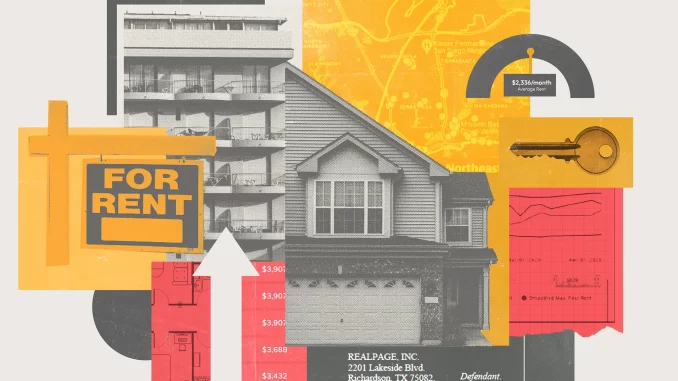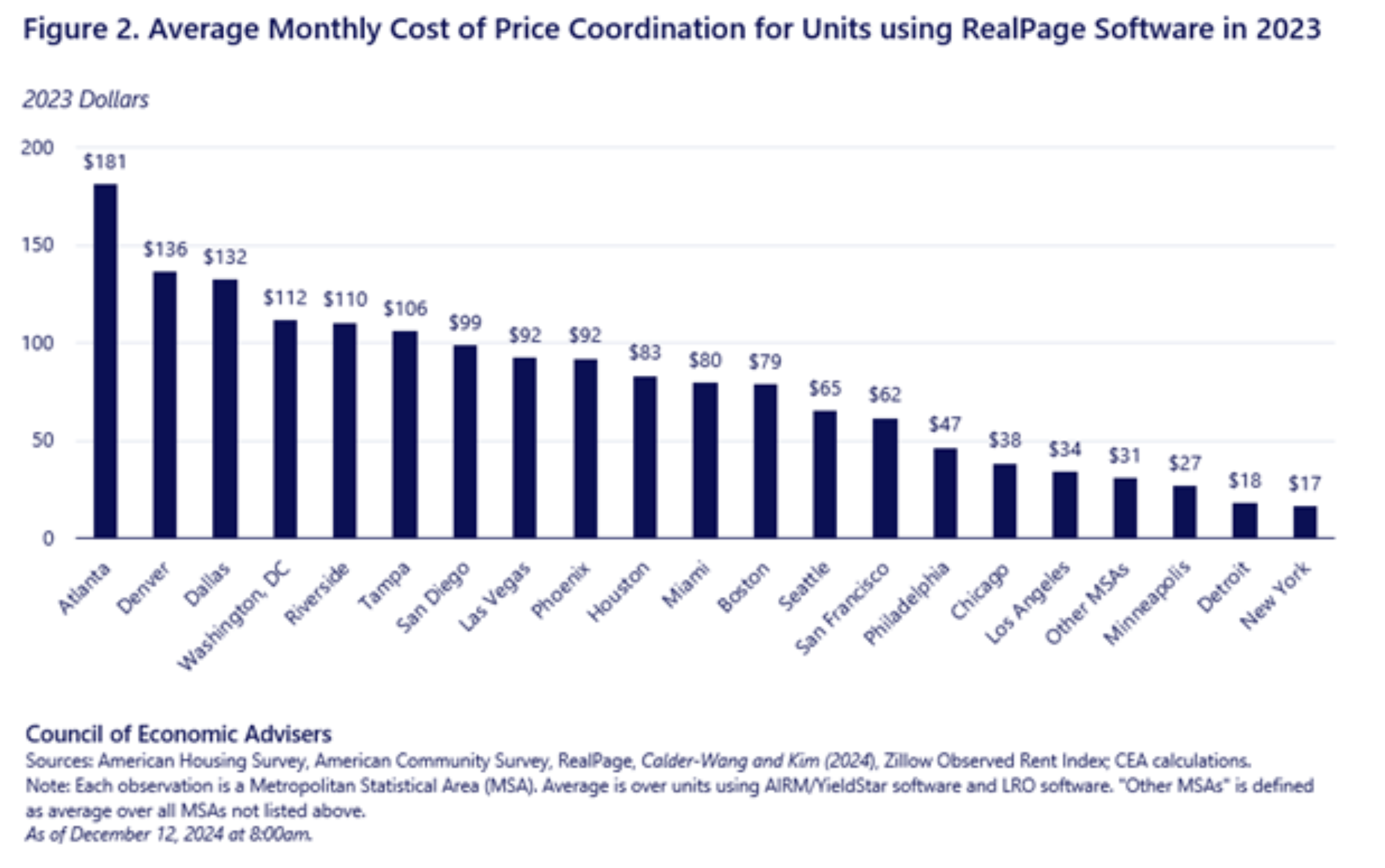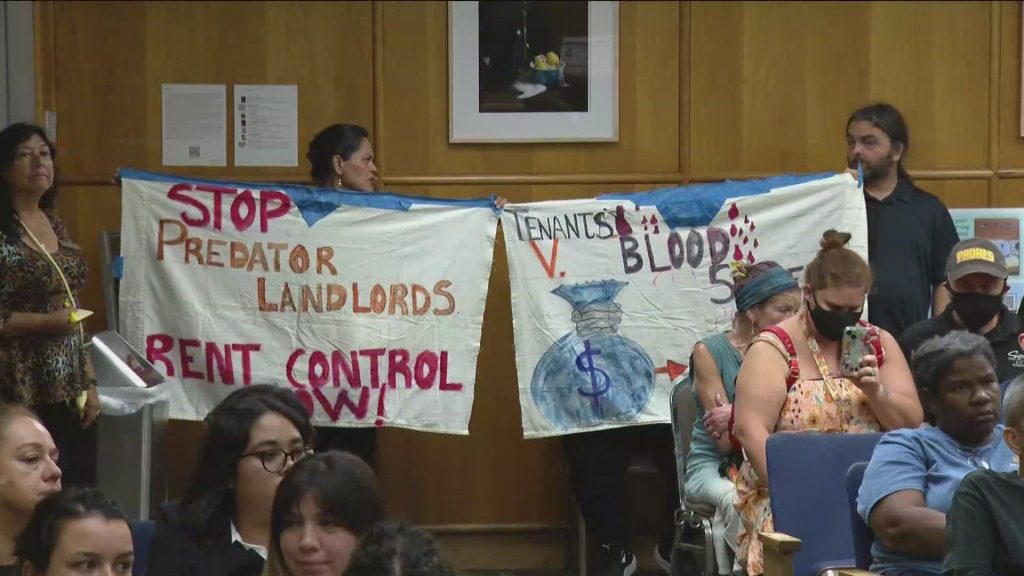
Have you been looking for an apartment to rent? Have you noticed that no matter how many times you search and compare the prices, they seem so similar and keep on rising every now and then?
It is not a coincidence. It is happening right now, wherein landlords no longer decide on the rent.
Yes, you read it right. Something bigger has been set up to determine how much you pay for rent to live—Artificial Intelligence (AI) is in action.
It is no surprise that AI has been revolutionizing almost, if not yet all, our industries, and the rental market has become its new frontier. Gone are the days of rent prices being purely determined by landlords through market research, knowledge, and competitor checks. According to proponents and a study by Goel (2023), AI’s impact on the rental industry spans from improvements in decision-making based on data-driven insights, task automation, enhanced market analysis and adjustments, price optimization, and profitability. However, it has also raised concerns on ethical dilemmas, biases, transparency, AI and algorithmic regulation gaps, market manipulation, and collusion (Goel, 2023; Crawford, 2021; Calder-Wang & Kim, 2023).
What did this lead to? Unprecedented skyrocketing rents, synchronized price spikes, and the aggravation of accessibility to affordable housing—of which millions of Americans are now grappling with.
The AI software tool is called AI Revenue Management. It is embedded in the system of RealPage, a leading Texas-based rental pricing platform, which is now at the forefront of controversies and lawsuits due to its system allegedly destabilizing the market.
Let us deep dive into it, how it works, and why it is crucial, more than ever, to balance innovation with smart regulation.
How AI-Powered Pricing System Works
In theory, algorithmic pricing refers to setting prices automatically for a firm’s profit maximization (Sanchez-Cartas & Katsamakas, 2024). It works to predict the maximum viable pricing by analyzing rental demand, historical market trends, competitor’s pricing, and property location, among others. Superseding the need for spreadsheet work or gut instinct, the system processes and automates tons of variables in seconds and recommends prices (Basal, Saraç, & Özer, 2024). This puts landlords at an advantage, making them competitive while maximizing revenue.
The Federal Register explained that RealPage requires landlords to provide the company with sensitive information about their properties, including unit availability, how fast it gets occupied, charges on rents, and even the promotions they offer tenants. Simply put, the company takes all the data, crunches them through the algorithm, and transmits daily rent recommendations to landlords.
While this may sound like an efficient method for landlords, it raises questions about transparency—how do the algorithms direct the “right” rent prices? If it increasingly adjusts the prices driven by slight shifts in demand, how can tenants, especially those who can no longer afford the rising prices, know if it is fair? As Pasquale (2015) questioned, ‘Is the algorithm pricing fair?’
RealPage Controversy and Lawsuit – Smart Pricing or Price Fixing?

The U.S. Department of Justice (DOJ), in August 2024, filed an antitrust lawsuit against RealPage for its implication in an “unlawful scheme to decrease competition among landlords in apartment pricing” called price coordination. This allows individual landlords to act as ‘single dominant ones’ and utilize this collective market power to generate more profits through tagging higher prices. This is deemed alarming, as RealPage dominates the rental market with approximately 80% control.
Look at the White House Council of Economic Advisers (CEA) report in 2023 below, showing the artificial inflation of rental prices due to price coordination, which costs an additional $70 a month, or 4% in rent, on average. In six (6) metro areas, including Denver, Atlanta, Dallas, Riverside, DC, and Tampa, the price hike linked to RealPage has exceeded $100 monthly, and the company has cost American renters an estimated $3.6 billion in 2023 (Council of Economic Advisers, 2024).

The system’s impact does not stop here. The CEA report outlined that the company tracks whether the landlords are following the system, of which, in many cases, the landlords choose to let the system set the rent for them automatically without re-evaluating. Moreover, the DOJ said that some even opt for policy changes, like terminating renter-friendly concessions.
RealPage executives are straightforward about their goal: ‘avoid a race to the bottom’, which means keeping rents high across the board and serving dominant interests (Crawford, 2021). The algorithm then becomes a middleman that colludes prices—meaning, ‘no competition.’ In this sense, AI becomes a ‘registry of power’ (Crawford, 2021).
As the company’s defense against its allegations, RealPage has established a website to set forth its business practices, arguing that ‘customers always have 100% discretion to accept or reject the price recommendations.’ However, it also undermines its argument because the software—as what the company revealed to ProPublica—intends to ‘outsource daily pricing and ongoing revenue oversight.’
“I think it’s driving it, quite honestly… As a property manager, very few of us would be willing to actually raise rents double digits within a single month by doing it manually,” RealPage Executive Andrew Bowen revealed.
Where are the transparency and fairness, then?
Moreover, the DOJ, in January 2025, amended the complaint to include six major landlords who allegedly participated in the anti-competitive scheme of RealPage.
Further, in 2020, RealPage was found using faulty computer algorithms for automated tenant background checks, resulting in some tenants being associated with criminal charges (Kirchner, 2020).
Canadians have also been experiencing rent price hikes, as mega landlord Dream Unlimited utilized YieldStar, a form of revenue management system by RealPage too (The Breach, 2024).
“Tenants in the building are furious about learning that Dream is using the same technology that corporate landlords use in the United States,” York South-Weston Tenants Union Co-Chairman Chiara Padovani stressed.
Impact on Tenants – Big Tech, Big Rent
The tenants bear the huge brunt linked to the system—left and squeezed into paying the price.
“Use the law to stand up for the people.”—North Carolina Attorney General Jeff Jackson unmasks RealPage’s use of AI, which causes rent prices to rise, and he is taking it to court.
For Americans, housing is their top expense, allocating more than one-third of their income to ensure they get the ‘greatest value’—that is, within their income means (U.S. Department of Justice, 2025). Renters wholly depend on the competition.
The Denver Post reported that Denver tenants have been shouldering the ‘second-highest extra cost each month’ due to RealPage’s algorithm, which is $136 on average. What is more alarming, the report said, is that more than 45% of rental properties in the region have the same software embedded in them.
In San Diego, according to RentCafe, rents have increased by 21% since 2020. As of November 2024, monthly rent costs $2,336—which is 50% higher than the average rent nationally.

Meanwhile, a tenant in Boulder, Colorado, William Hess, frustratingly said in an interview, “Price gouging is outrageous. The pricing is way out of line for what their services are.”
FOX31 Denver (2022). Tenants in Colorado express frustration and outrage on rental hikes; wanting to join a lawsuit against corporate landlords.
In Canada, rent-burdened tenants were pushed to the wall—from getting a roommate to share the apartment with, taking on multiple hustles, or even cutting down on food—just to cover their rents.
Padovani further voiced the tenants’ grievances, saying, “Whenever someone gets a rent increase above rent control, what we hear from people is, ‘Where are we supposed to go? Because if I lose my home where I’m living right now and have to find a new place to live, there is nowhere that is going to be the same price—let alone cheaper.’” “So, tenants don’t have a choice,” he added.
The Bigger Picture: Ethics in AI, Algorithmic Governance
The controversy presents a major factor—the absence of clear oversight and regulation on using AI in rental pricing. Despite the increasingly growing interest in governing AI, there are no solid, sector-specific guidelines yet for the system’s implementation nor tenant rights and protection.
Bans are being imposed to prevent landlords from utilizing the software, including the first-in-the-nation ban by San Francisco, the Philadelphia City Council’s ban passing with a veto-proof vote, an ordinance under development in San Diego, and San Jose, New Jersey, and Portland’s plan to enforce the same approach. Meanwhile, in Canada, the Colorado House passed House Bill 1004, mandating ‘No Pricing Coordination Between Landlords.’
While these initiatives would halt the software for some time, it will not solve the root causes. AI ethics demand more than just saying ‘no’ or ‘pause,’—it requires addressing ‘how’ and ‘for whom’ the technology is created.
RealPage’s algorithm-powered system operates like a Black Box (Pasquale, 2015)—tenants have no idea how their rents are determined, nor can they contest the price surges effectively—such lack of transparency signals concern about tenant rights and ethical AI governance. Pasquale (2015) emphasized this, stating that automation might lead to ‘wrong, biased, or destructive’ judgment, like what happened to one of the largest online real estate firms, Zillow, that also invested in AI (Susarla, Purnell, & Scott, 2024).
With the lack of clear guidelines and regulatory framework, how can landlords be controlled in pushing the system’s boundaries for profit maximization? Who protects the tenants? As Flew (2021) argued, this issue raises an overarching question on ethics and trust in today’s age.
The Path Forward: Regulation as Solution
How the AI-powered system works in the rental market—offering opportunities and challenges—is both game-changing and concerning.
Innovation is necessary for it to thrive in the fast-paced era, but so is regulation. As Goel (2023) emphasized, regulation is integral to holding back companies from treading into misuse of AI in their processes, from tenant selection to lease management and rent prices. Similarly, Calder-Wang & Kim (2023) argued that before running the AI-based decision aids for human users, systematically studying its fairness attributes is crucial to possibly ease the bias level.
Though there are no one-size-fits-all measures and strategies, however, conducting annual algorithm reviews, fair price analyses, and providing tenants with information about the process to ensure they know the potential rent increase or decrease (Goel, 2023) could serve as the starting point in moving the needle. Moreover, strengthening antitrust laws against collusion, human oversight, and putting price caps in place might also be considered to prevent exploitation of market conditions, encourage fair competition, and standardize price range.
Ultimately, there is a need for the government, policymakers, housing advocates, companies, and AI developers to work hand in hand in establishing the right policies and guidelines that will both serve landlords and tenants, with the government playing the core role of regulating AI usage and implementation, to ensure it meets ethical standards. Additionally, regulatory bodies should provide recommendations on the appropriate AI use for a company’s operations, including pricing strategies, data protection, and tenant rights (Goel, 2023).
As Goel (2023) puts it, AI in the rental industry is ‘reasonably new’, and regulations might differ in various countries. However, there is an emerging alignment on key ideas, including the enforcement of data protection laws, increasing accountability, and efforts to crack down on algorithmic bias. This will potentially build a foundation for crafting the necessary framework to balance innovation and regulation the industry must have.
Why Does it Matter?
Tackling the issue is crucial, as authority has been increasingly upheld ‘algorithmically’ (Pasquale, 2015). All the more, as AI continues to transform the rental market, which sooner or later might steer other countries’ systems, too, the pressing priority to bridge the regulatory gap in AI-powered systems cannot be overemphasized. This is to ensure that housing—a fundamental necessity—will not become an inaccessible commodity. Landlords and renters alike should benefit equitably.
As Ursula Franklin writes, “The viability of technology, like democracy, depends in the end on the practice of justice and on the enforcement of limits to power.”
What is Ahead?
The future for rent is AI-driven, and the broader challenge remains: How can we harness what the system promises without jeopardizing the marginalized renters? Without triggering a housing crisis?
The stakes are too high to ignore.
To the AI landlord, fix the system, not the price.
Anchoring technology’s potential with societal good must always be our way forward.
References
Allyn, R. (2024, September 17). San Diego renters facing rate hikes demand rent control. CBS8 News. https://www.cbs8.com/article/news/local/rally-for-rent-control/509-264dcaad-fb1c-4425-a3df-26394b6dff63
Antitrust Division, Department of Justice. (2025, January 30). United States of America et al. v. RealPage, Inc. et al.; Proposed final judgment and competitive impact statement. Federal Register, 90(20), 8560–8607. https://www.federalregister.gov/documents/2025/01/30/2025-01886/united-states-of-america-et-al-v-realpage-inc-et-al-proposed-final-judgment-and-competitive-impact
Basal, M., Saraç, E., & Özer, K. (2024). Dynamic pricing strategies using artificial intelligence algorithm. Open Journal of Applied Sciences, 14(8). https://doi.org/10.4236/ojapps.2024.148128
Brennan, M. (2024, December 31). Colorado renters face higher rents due to RealPage’s pricing algorithms, White House report finds. The Denver Post. https://www.denverpost.com/2024/12/31/colorado-realpage-rent-algorithms-renters-apartments-white-house-report/
Calder-Wang, S., & Kim, G. H. (2024, August 16). Algorithmic pricing in multifamily rentals: Efficiency gains or price coordination? SSRN. https://doi.org/10.2139/ssrn.4403058
Calvano, E., Calzolari, G., Denicolò, V., & Pastorello, S. (2020). Artificial Intelligence, Algorithmic Pricing, and Collusion. The American Economic Review, 110(10), 3267– 3297. https://www.jstor.org/stable/26966472
Colorado General Assembly. (2024, March 22). HB25-1004: Rent-setting software legislation. https://leg.colorado.gov/bills/HB25-1004
Council of Economic Advisers. (2024, December 17). The cost of anticompetitive pricing algorithms in rental housing. The White House. https://bidenwhitehouse.archives.gov/cea/written-materials/2024/12/17/the-cost-of-anticompetitive-pricing-algorithms-in-rental-housing/
Crawford, K. (2021). The atlas of AI: Power, politics, and the planetary costs of artificial intelligence. Yale University Press.
Flew, T. (2021). Regulating platforms. In Regulating platforms (pp. 79-86). Polity.
FOX31 Denver. (2022, November 2). Coloradans seek to join rental class action lawsuit [Video]. YouTube. https://www.youtube.com/watch?v=36gwLuTIIIM
Goel, K. (2023). Applications of GenAI to the rentals industry. Journal of Artificial Intelligence & Cloud Computing, 2(1), 1–13. https://doi.org/10.47363/JAICC/2023(2)E189
Kirchner, L., & Goldstein, M. (2020, May 28). Access denied: Faulty automated background checks freeze out renters. The Markup. https://themarkup.org/locked-out/2020/05/28/access-denied-faulty-automated-background-checks-freeze-out-renters
Jackson, J. [@jeffjacksonnc]. (2025, March 18). AG Jeff Jackson (NC): The rent is too high. [Video]. TikTok. https://www.tiktok.com/@jeffjacksonnc/video/7482785957427612974
Librarianship Wreck. (2021, January 13). Authoritarian and democratic technics revisited. https://librarianshipwreck.wordpress.com/2021/01/13/authoritarian-and-democratic-technics-revisited/
McKee, S. (Producer). (2024, March 18). Coloradans seek to join rental class action lawsuit [Video]. YouTube. https://www.youtube.com/watch?v=36gwLuTIIIM
Mercury News. (2024, September 5). San Jose may consider ban on rent-setting software after antitrust suit. https://www.mercurynews.com/2024/09/05/san-jose-may-consider-ban-on-rent-setting-software-after-antitrust-suit/
New Jersey Monitor. (2024, October 24). Lawmakers advance bill to ban landlords’ use of rent-setting software. https://newjerseymonitor.com/2024/10/24/lawmakers-advance-bill-to-ban-landlords-use-of-rent-setting-software/
Pasquale, Frank (2015). ‘The Need to Know’, in The Black Box Society: the secret algorithms that control money and information. Cambridge: Harvard University Press.
Philadelphia City Council. (2024, October 12). Weekly report: Democracy in action during this week’s Philadelphia City Council session. https://phlcouncil.com/weekly- report-democracy-in-action-during-this-weeks-philadelphia-city-council-session/
ProPublica. (2022, March 29). The algorithm behind RealPage’s rent hikes. ProPublica. https://www.propublica.org/article/yieldstar-rent-increase-realpage-rent
RealPage. (2025). RealPage. https://www.realpage.com
RealPage. (2025). Revenue management. https://www.realpage.com/asset-optimization/revenue-management/
RealPage. (2025). Our position. RealPage Public Policy. https://www.realpagepublicpolicy.com/our-position
RentCafe. (n.d.). Average rent in San Diego, CA, and market trends. https://www.rentcafe.com/average-rent-market-trends/us/ca/san-diego/
Sanchez-Cartas, J. M., & Katsamakas, E. (2024). AI pricing algorithms under platform competition. Electronic Commerce Research. https://doi.org/10.1007/s10660-024-09821-w
San Francisco Board of Supervisors. (2024, April 15). Resolution to approve the ordinance for housing [Document]. https://sfgov.legistar.com/View.ashx?M=F&ID=13157163&GUID=BC67A1E5-F3C7-4EF9-929A-46203D6E63B1
Susarla, P., Purnell, D., & Scott, K. (2024). Zillow’s artificial intelligence failure and its impact on perceived trust in information systems. Journal of Information Technology Teaching Cases, 0(0). https://doi.org/10.1177/20438869241279865
The Breach. (2024, October 21). Canadian mega landlord using AI ‘pricing scheme’ as it massively hikes rents. https://breachmedia.ca/canadian-mega-landlord-ai-pricing-scheme-hikes-rents/
Times of San Diego. (2024, October 30). Council committee seeks ban on use of software blamed for price-fixing in housing market. https://timesofsandiego.com/politics/2024/10/30/council-committee-seeks-ban-on-use-of-software-blamed-for-price-fixing-in-housing-market/
United States Department of Justice. (2025). United States of America et al. v. RealPage, Inc. et al., Proposed Final Judgment and Competitive Impact Statement. Federal Register, 90(20),85608607. https://www.federalregister.gov/documents/2025/01/30/2025-01886/united-states-of-america-et-al-v-realpage-inc-et-al-proposed-final-judgment-and-competitive-impact
U.S. Department of Justice. (2024, August 23). Justice Department sues RealPage for algorithmic pricing scheme that harms millions of American renters. U.S. Department of Justice. https://www.justice.gov/archives/opa/pr/justice-department-sues-realpage-algorithmic-pricing-scheme-harms-millions-american-renters
Vogell, H. (2022, October 15). How a secret rent algorithm pushes rents higher. ProPublica. https://www.propublica.org/article/yieldstar-rent-increase-realpage-rent

Be the first to comment